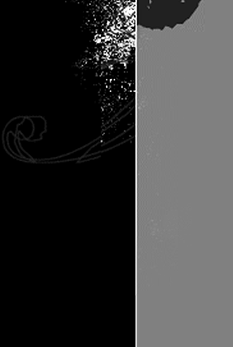+++ INFLUENCE +++
It should be noted that the creation of Shoujo Kakumei Utena draws strong parallels to an old seventies shoujo anime called Rose of Versailles. The latter greatly influenced the former by the story and through the characters.
Rose of Versailles is set in pre-Revolution France, and tells the tale of a young woman named Oscar Jarjeyes, who is raised in the French palace as a male. Oscar finds herself acting as the personal bodyguard and friend of Marie Antoinette, the queen of France.
Rose of Versailles succeeds in incorporating real historic figures with fictional ones and manipulating real life events and circumstances to make a political statement about the society which still holds true today. It is a story that raises questions about the different classes in society, and the differences and similarities between males and females.
In the nineties, Chiho Saito, manga artist and the lovely creator of Shoujo Kakumei Utena, penned her own series which involved a young female heroine longing to become a prince. The heroine's name was Tenjou Utena, and the series was was entitled Shoujo Kakumei Utena.
Immediately, there is a connection between the two heroines of both stories. Oscar is just like Utena and vice versa. Both are females, yet act masculine, essentially making them a bit androgynous which causes both characters to struggle with their conflicting female and male identities. They also share other similar personality traits such as their confidence, their loyalty, their strong sense of justice, as well as being fantastic swordwomen. The two characters also share the quality of being idealists, which ultimately effects their perception of the world. Oscar saw the injustice between the different social classes while Utena saw that the world was not as innocent as she thought it to be.
Another comparison can be made by the character designs of the two protagonists. Though the style of Rose of Versailles is clearly seventies anime (note the feathered hairdo Oscar sports), the uniform that Oscar wears is similar to the old-fashioned militaristic look of the outfits the characters from Shoujo Kakumei Utena wear, most prominently when Utena is fighting a duel, or the Student Council's special uniforms. Another similarity (at least in my opinion) is the actual character design itself of the two heroines. Oscar looks similar to the movie version of Utena. Note that the original manga version of Utena was actually a blonde, which would have made Utena more similar in terms of looks. Take a look for yourself:
One of the most important factors in both of these stories is the relationship between the two female protagonists, in Versailles, it is Oscar and Marie, in Utena, it is Utena and Anthy. In Versailles, Oscar acts as a personal escort and confidante of Marie, which is quite similar to Utena and Anthy. Oscar did not originally wish to become Marie's personal escort but she is thrust into the position against her will, as is Utena when she becomes "engaged" to Anthy. Utena says that she will purposely lose during her re-match with the vice-president Kyouichi Saionji, but can never bring herself to do so. All the same, Oscar becomes inexplicably devoted to Marie as well and then takes her duty quite seriously. Both Oscar and Utena are fiercely devoted to their loved ones and are very ambitious. Utena constantly protects Anthy and the two become very close to each other emotionally, but because Chiho Saito enjoys exploring more complex relationships, she made the pair's relationship slightly ambiguous.
The plots of both series also involve a revolution, the French Revolution (a real life historical event, although modified for story purposes in Versailles) or Oscar's revolution (the fictional revolution), and Utena's revolution. Oscar strives to bring equality to the people of France so that the disputing social classes would live together in harmony. Utena's goal is to break the chains that bind down Anthy, who is stuck playing the role of the Rose Bride, and essentially breaks the chains that bind each character down in Utena. This concept is further explored in the revolution section in the anime version, or the revolution from the movie.
Their fates are also comparable since Oscar's fate is sealed by her father's desire to make her into a soldier since he had wished for a boy and not a girl. Although Utena chooses to become a prince by personal choice, their endings are similar because Oscar dies at the end of Versailles, while Utena is hinted to have disappeared as well.
|
